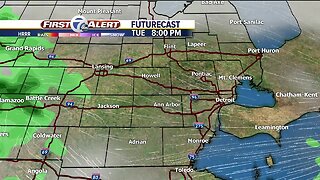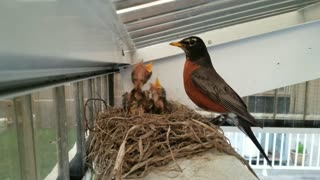Premium Only Content

Stork sacrifices one of her chicks to increase the survival chances of her other offspring
Last week we witnessed a dramatic event in the white storks´ nest in front of the Urdaibai Bird Center. As we were observing the nest and its occupants, the adult stork started to attack one of its young. Having received many vicious blows to its neck, the young stork finally fell out of the nest. Members of the UBC later recovered the bird but it was seriously injured. It was taken to the Biscay Regional Government Wildlife Sanctuary but died two days later.
In birds, parental infanticide is a means of saving energy. By eliminating the individual which has the least chance of survival, the adults aim to increase that of the others. This type of behaviour has been observed in the Eurasian coot, the Mexican gull, the white stork and the black stork. In a study carried out in Andalusia parental infanticide was observed in 15% of white stork nests.
In general, it is the male which kills the smallest of the young and this usually occurs when they are less than a week old. What makes the event in Urdaibai different is that the individual which was killed was more than a month old and therefore almost fully grown.
The reason for this unusual behaviour could be the disappearance of one the adults which had been feeding the chicks. It would appear that after the death of its partner, the remaining stork was left with the impossible task of rearing three chicks alone. Faced with this situation it could only eliminate one of its dependents in order to guarantee the survival of the others.
Nature is very wise. Had it not done this the entire brood would have been put at risk.
So, hard though it may seem, one life was sacrificed to save the others.
-
 2:17
2:17
WXYZ
3 years agoRain chances increase
20 -
 2:41
2:41
WTMJMilwaukee
3 years agoChances for storms increase during Monday afternoon, evening
92 -
 2:25
2:25
WSYM
3 years agoBreezy and mild, but shower/storm chances increase
1 -
 1:53
1:53
WTMJMilwaukee
3 years agoChances for storms increase during Monday afternoon, evening
65 -
 1:53
1:53
WTMJMilwaukee
3 years agoChances for storms increase during Monday afternoon, evening
55 -
 1:59
1:59
WTMJMilwaukee
3 years agoChances for storms increase during Monday afternoon, evening
47 -
 2:14
2:14
WXYZ
4 years agoRain/Thunder chances increase
14 -
 1:11
1:11
KNXV
3 years agoThe BULLetin Board: Building strong friendships can increase survival rates
3 -
 2:01
2:01
Streets Canada
3 years agoAmerican Robin feeding her chicks
33 -
 0:25
0:25
Curiosities fnt
3 years ago $0.02 earnedMother duck with her chicks
811